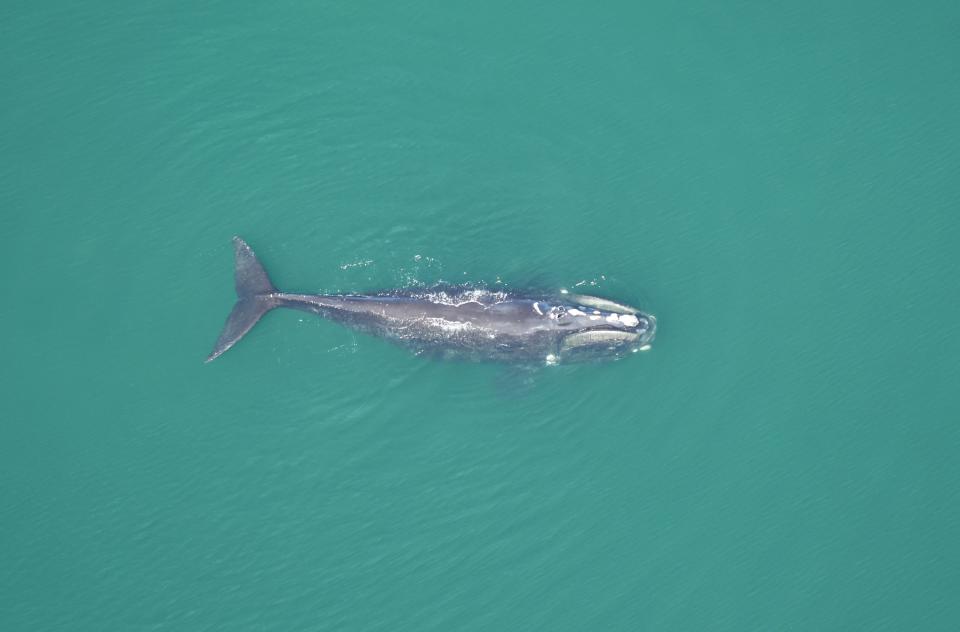Lawsuit claiming to save whales by delaying Vineyard Wind project dismissed. Now what?
A lawsuit filed with hopes of stopping construction of Vineyard Wind 1, expected to begin installing turbines soon in waters about 15 miles south of Martha's Vineyard, was recently dismissed from the U.S. District Court for the District of Massachusetts.
Brought to court in August 2021 by Nantucket Residents Against Turbines - which also goes by ACKRATS - the suit was filed primarily out of concern for critically endangered North Atlantic right whales, as well as other marine animals and the marine ecosystem, in the offshore wind development area designated in federal waters on the outer continental shelf. The Nantucket residents also cited concern about impacts on Nantucket's historic landmark status.
Touted as the nation's first commercial-scale offshore wind farm, Vineyard Wind, under development by Avangrid and Copenhagen Infrastructure Partners, is on track to generate 800-megawatts of electricity annually, powering more than 400,000 homes, starting later this year. Plans call for 62 General Electric Haliade-X turbines, spaced 1 nautical mile apart.
Cape Cod wind farm guide: Offshore wind farms off Cape Cod and Martha's Vineyard: What to know.

In response to the court's dismissal, Nantucket Residents Against Turbines' founding director Val Oliver said his group was disappointed.
"We are taking a few days to weigh our options," she said Wednesday.
In a statement, Avangrid Chief Operating Officer Sy Oytan said the company "is pleased that the ruling issued by the U.S. District Court acknowledges the rigorous and thorough administrative review that the project underwent over the last many years."
The Nantucket residents' lawsuit claimed federal agencies' environmental reviews were inadequate.
The Nantucket group's motion for summary judgement challenged pivotal federal environmental approvals granted to the project — specifically the biological opinion given by the National Marine Fisheries Service and the final environmental impact statement issued by the Bureau of Ocean Energy Management. Secretary of the Interior Debra Haaland, and Secretary of Commerce Gina Raimondo were also named in the suit.
Asserting that the federal agencies failed to give the project adequate review according to the National Environmental Policy Act, the Endangered Species Act and the Administrative Procedure Act, the Nantucket group hoped to convince the court to toss both the biological opinion and the final environmental impact statement.
The group then hoped the court would issue an injunction to protect the right whales until the agencies complied with the laws.
North Atlantic right whale bracket Whale matriarch Wart voted Cape's favorite
In a statement issued in January, the Nantucket group specifically maintained that the agencies "issued a legally defective biological opinion, ignored increased stress on right whales, failed to complete an adequate Environmental Impact Statement and issued illegal 'incidental take authorizations' that would jeopardize this critically endangered species."
A federal judge disagreed, noting federal protections for right whales and other marine animals.
U.S. District Court Judge Indira Talwani was not convinced. In a May 17 memorandum and order she found no evidence that the agencies fell short in their duties of protecting of the marine ecosystem, including right whales. In her conclusion, she wrote that the Nantucket group "failed to demonstrate that NMFS or BOEM violated the Endangered Species Act or the National Environmental Policy Act in considering and issuing the 2021 biological opinion or the Final Environmental Impact Statement for the Vineyard Wind Project."
Talwani's 52-page finding further pointed out numerous terms and conditions the agencies spelled out with an eye toward protecting right whales and other marine animals. As the biological opinion acknowledges, Talwani wrote, "numerous mitigation measures are designed not only to protect right whales from harassment, but also to protect other species."
Offshore wind and Cape Cod fishing Cape Cod fishing alliance wants more research on effects of offshore wind
Here's how marine life is protected during wind turbine construction.
Among the measures are vessel speed restrictions and a seasonal restriction on pile driving that prohibits turbine pile driving from Jan. 1 through April 30 "to avoid the time of year with highest densities of right whales in the project area."
Another measure requires Vineyard Wind to employ qualified protected-species observers to monitor marine mammals during pile driving, with at least two observers stationed on the pile driving vessel at all times, as well as 60 minutes prior to, and 30 minutes after, pile driving.
Passive Acoustic Monitoring is also required to record ambient noise and marine mammal vocalizations in the lease area before, during, and after construction "to monitor project impacts relating to vessel noise, pile driving noise, (wind turbine) operational noise, and to document whale detections" in the wind development area.
North Atlantic right whales off Cape Cod Only about 340 right whales remain worldwide. Many visit Cape Cod Bay. Meet eight of them.
What about whale deaths near wind turbine projects off New York and New Jersey coasts?
The National Oceanic and Atmospheric Administration, of which the marine fisheries service is a part, is worried about whale deaths off New York and New Jersey, where other offshore projects are in development.
"At this point, there is no evidence to support speculation that noise resulting from wind development-related site characterization surveys could potentially cause mortality of whales, and no specific links between recent large whale mortalities and currently ongoing surveys," according to the agency.
The agency said it will continue to gather data to determine cause of death and how human activities impact marine mammals.
Heather McCarron writes about climate change, environment, energy, science and the natural world, in addition to news and features in Barnstable, Brewster and Falmouth Reach her at hmccarron@capecodonline.com, or follow her on Twitter @HMcCarron_CCT
Thanks to our subscribers, who help make this coverage possible. If you are not a subscriber, please consider supporting quality local journalism with a Cape Cod Times subscription. Here are our subscription plans.
This article originally appeared on Cape Cod Times: Nantucket resident lawsuit to pause offshore wind project dismissed

